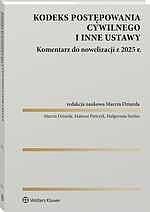Traktowanie third-party access w odniesieniu do sieci elektroenergetycznej jako wywłaszczenia i naruszenia zasady równego i sprawiedliwego traktowania (fair and equitable treatment) stanowi zagrożenie dla ukończenia procesu tworzenia wewnętrznego rynku energii elektrycznej, ale jednocześnie potwierdza znaczenie pewności prawa w Unii Europejskiej.
Poniższy artykuł dotyczy dostępu osób trzecich (third-party access) do infrastruktury energetycznej, przede wszystkim sieci elektroenergetycznej, i konsekwencji, jakie mogą wyniknąć dla inwestorów, którzy dokonali kosztownych inwestycji o długim okresie zwrotu w sektorze energetycznym w oparciu o dotychczasowy stan prawny, następnie zmieniony w związku z implementacją prawa Unii Europejskiej przez państwa członkowskie. Analiza opiera się na wyroku Trybunału Sprawiedliwości Unii Europejskiej w sprawie Komisja przeciwko Słowacja (C-264/09), w której to Trybunał uznał, że podstawowa zasada liberalizacji rynku energii w Unii Europejskiej, czyli zasada dostępu osób trzecich, może prowadzić do wywłaszczenia inwestora, który zainwestował w rozbudowę sieci elektroenergetycznej na terenie Unii Europejskiej w okresie poprzedzającym liberalizację sektora. Opierając się na tym wyroku, poszerzam ocenę dokonaną przez Trybunał pod kątem spełnienia przesłanek prowadzących do wywłaszczenia inwestora, o analizę orzeczeń arbitrażu inwestycyjnego dotyczących zarówno wywłaszczenia, jak i standardu równego i sprawiedliwego traktowania (fair and equitable treatment). Dokonując częściowej krytyki tego wyroku z uwagi na nieprzekonujący sposób argumentacji Trybunału w kwestii wywłaszczenia, ostatecznie popieram stanowisko Trybunału, zgodnie z którym bezwzględne przestrzeganie zasady dostępu osób trzecich może prowadzić do pozbawienia inwestora prawa do zwrotu kosztów inwestycji i osiągnięcia rozsądnego zysku, co może stanowić formę wywłaszczenia, a radykalna zmiana warunków inwestycji, w tym regulacji prawnych, na których inwestor miał prawo polegać dokonując inwestycji, kwalifikuje się jako naruszenie zasady fair and equitable treatment.
Kontrowersyjne orzeczenie w sprawie Komisja przeciwko Słowacja należy rozpatrywać na tle rosnącego znaczenia zasady pewności prawa w Unii Europejskiej, w szczególności w sektorze energii elektrycznej, który z uwagi na przestarzałą i słabo rozbudowaną infrastrukturę wymaga znacznych inwestycji. Trybunał wielokrotnie podkreślał znaczenie pewności prawa w sektorze energetycznym, kładąc nacisk na przestrzeganie okresów przejściowych w procesie liberalizacji rynku, jak też uznając prawa inwestorów w sektorze energii odnawialnej do otrzymywania subsydiów zgodnie z pierwotnymi założeniami prawnymi.
Orzeczenie w sprawie Komisja przeciwko Słowacja może mieć doniosłe znaczenie dla inwestorów spoza Unii Europejskiej, którzy prowadząc działalność na terenie Unii bezpośrednio podlegają regulacjom unijnym, zmierzającym do zwiększenia konkurencyjności w sektorze energii. Jednym z największych graczy na rynku gazu naturalnego jest Gazprom. Regulacje Unii Europejskiej dotyczące unbundlingu zintegrowanych pionowo przedsiębiorstw odpowiedzialnych za transport naturalnego gazu, jak również sposobu organizacji dostępu do systemu przesyłu gazu (entry-exit system i wymóg bundlingu zdolności przesyłowej) wiążą się z koniecznością renegocjacji przez Gazprom umów przesyłu i dystrybucji, a ponadto mogą prowadzić do ograniczenia wcześniej wynegocjowanej zdolności przesyłowej.
Artykuł dotyczy zatem konfliktu interesów pomiędzy pełną liberalizacją rynku energii w Unii Europejskiej, a prawami inwestorów do zwrotu inwestycji i uzyskania zysku w oparciu o dotychczasowe regulacje prawne i umowy zawarte w przeszłości. (poniżej pełna treść artykułu w języku angielskim)
Autorka, Kamila Mysiewicz, aplikantka adwokacka przy Okręgowej Radzie Adwokackiej w Warszawie, magister prawa na Uniwersytecie Warszawskim, studentka LL.M. na Uniwersytecie Aberdeen (Oil and Gas Law), wcześniej prawnik w White & Case P. Pietkiewicz, M. Studniarek i Wspólnicy – Kancelaria Prawna sp.k. (dawniej White & Case W. Daniłowicz, W. Jurcewicz, i Wspólnicy – Kancelaria Prawna sp.k.) w Warszawie i CMS Cameron McKenna Dariusz Greszta sp.k. w Warszawie.
....................
Third-party access as expropriation and a breach of fair and equitable treatment standards in judgments of the European Court of Justice and international investment arbitration awards.
Kamila Mysiewicz*
Treating third-party access to electricity networks as expropriation and a breach of fair and equitable treatment standards poses a threat to the completion of the internal electricity market; however, it contributes to the principle of legal certainty in the European Union.
This article analyses the possible consequences of the European Court’s of Justice decision to treat third-party access as expropriation for the common energy market. The discourse is relevant in view of the current implementation problems of some member countries with regard to unbundling mechanisms, which are perceived by investors from third countries as a threat to their investments. It analyses the decision under international investment standards and sets it against the European Union’s legal certainty principle.
Regulatory stability in the European Union
The principle of legal certainty is of paramount importance in the legal framework of the European Union. Its role should not be underestimated especially in the electricity sector, which, due to insufficient and obsolete infrastructure, requires considerable investments.1 As a result of capital intensity of infrastructure projects and budgetary problems of governments, these investments will have to be financed by private capital.2 Investors indicate the lack of legal certainty and regulatory predictability as one of the main obstacles to investments.3 Expectations of investors as to the conditions under which they operate and the return that they predict to receive are the foundation of regulatory stability rule in EU law and the cornerstone of the fair and equitable treatment standard under international investment law. The ASM Brescia4 case confirms the role of regulatory stability in the European Union, emphasising the significance of transitional periods in the completion of internal natural gas
*Kamila Mysiewicz - Advocate Trainee at the Regional Chamber of Advocates in Warsaw, Master’s Degree in Law (Warsaw University), LL.M. student at the University of Aberdeen (Oil and Gas Law), previously associate at White & Case P. Pietkiewicz, M. Studniarek i Wspólnicy – Kancelaria Prawna sp.k. (formerly White & Case W. Daniłowicz, W. Jurcewicz, i Wspólnicy – Kancelaria Prawna sp.k.) in Warsaw and CMS Cameron McKenna Dariusz Greszta sp.k. in Warsaw.
1 Commission, ‘Energy 2020 - A Strategy for Competitive, Sustainable and Secure Energy’ COM (2010) 639 final.
2 Anatole Boute, ‘The quest for regulatory stability in the EU energy market: an analysis through the prism of legal certainty’ (2012) E.L.R. 37(6), 675.
3 Ibid.
4 ASM Brescia SpA v Comune di Rodengo Saiano (C-347/06) [2008] E.C.R. I-5641.
2
market. The subject of the stable “rules of the game” has been also addressed by the Court in numerous cases concerning the support schemes for renewable energy. In addition to that, Directive 2005/89 concerning the security of supply and infrastructure investment5 points out that it is important to lay down a stable framework which will facilitate the security of electricity supply and encourage investments in new transmission interconnection.6
Internal electricity market
Third-party access is a central concept in the liberalisation of the electricity market in the European Union. It is the subject of sector-specific regulations – three energy packages.7 Put simply, third-party access aims to ensure access to electricity networks at transmission and distribution levels for all energy undertakings, on a non-discriminatory basis, in order to improve competition on the energy market. Due to the fact that electricity networks are a natural monopoly, access to the network on equal terms for new suppliers is a necessary condition to establish competition.
In certain circumstances, third-party access obligation may clash with the legal stability principle and investment protection. It remains uncertain to what extent the completion of internal market in accordance with competition law can be subject to the rule of legal reliance and whether it may be compromised in favour of investment protection. As Talus and Wälde pointed out with regard to cross-border electricity network, ‘interconnectors thus illustrate the challenges increasingly and acutely posed by the tension between long-term infrastructure investment in the interest of energy security, and the "normal" application of competition law.’8
According to the European Commission, one of the priorities for the European Union is the energy infrastructure extension, upgrading and modernisation.9 At the same time, the
5 Directive 2005/89/EC of the European Parliament and of the Council of 18 January 2006 concerning measures to safeguard security of electricity supply and infrastructure investment [2006] OJ L33/22.
6 Ibid preamble.
7 Directive 1996/92 of the European Parliament and of the Council of 19 December 1996 concerning common rules for the internal market in electricity OJ L27/20 [hereinafter Directive 1996/92]; Directive 2003/54 concerning common rules for the internal market in electricity [2003] OJ L176/37 [hereinafter Directive 2003/54]; Directive 2009/72 concerning common rules for the internal market in natural electricity [2009] OJ L211/55 [hereinafter Directive 2009/72]; Regulation 1228/2003 on conditions for access to the network for cross-border exchanges in electricity [2003] OJ L176/1 [hereinafter Regulation 1228/2003] and Regulation 714/2009 on conditions for access to the network for cross-border exchanges in electricity [2009] OJ L211/15 [hereinafter Regulation 714/2009].
8 Kim Talus, Thomas Wälde, ‘Electricity interconnectors: a serious challenge for EC competition law’, (2006) 1 Competition and Regulation in Network Industries 3, 355.
9 Commission, ‘Communication to the European Parliament, the Council, the European Economic and Social Committee and the Committee of the regions’, COM(2010) 677 final, para 2.1.
3
European Union aims to enhance competition on an integrated internal market. However, as a result of insufficient financial resources, it may be possible to establish an integrated market with transboundary transmission capacities without ensuring perfect competition on it. The competition market theory is often at variance with the reality.
Commission versus Slovakia decision
In European Commission v. Slovak Republic10, the Court was faced with the challenge of striking a balance between competition and common market completion on the one hand and investment protection on the other. The case revolved around the relationship between Slovakia’s obligation to ensure non-discriminatory access to the electricity transmission network and its obligation to protect investment, pursuant to an agreement on the promotion and reciprocal protection of investments (“the Investment Protection Agreement”), signed before Slovakia’s accession to the European Union. The dispute arose out of an infrastructure project undertaken by a Swiss company, Aare-Tessin AG für Elektrizität (“ATEL”), to build a transmission line connecting the Slovak electricity system to Polish and Hungarian systems. The project was based on a contract, signed in 1997, between ATEL and Slovenské elektrárne a.s., a Slovakian undertaking, successor to which was Slovenská elektrizacná prenosová sústava, a.s. (“SEPS”), acting as the Slovak transmission system operator.
According to the contract, ATEL was granted the right of transmission capacity between Poland and Hungary for a limited period of time, from 1998 to 2014. The capacity right was in return for its financial contribution to the construction of the transmission line.
The European Commission requested the Court to declare that Slovakia failed to fulfil its obligations under Directive 2003/54. The Commission invoked the breach of the Directive by Slovakia by reserving a capacity right for the Swiss investor, which placed ATEL in a privileged position in comparison to other undertakings and, as a result, amounted to discriminatory treatment with regard to access to the network. According to the Commission, Slovakia could have terminated the contract and therefore eliminate the incompatibility between its international obligations and EU law, as required by Article 307(2) of the EC Treaty.11
10 Commission v. Slovak Republic (C-264/09), judgement of the Court of Justice of the European Union (First Chamber) of 15 September 2011, case not yet published [hereinafter Commission v. Slovakia].
11 Treaty establishing the European Community (OJ 2002 C 325/33) [hereinafter EC Treaty].






![Kodeks postępowania administracyjnego. Komentarz [PRZEDSPRZEDAŻ]](/gfx/prawopl/_thumbs/produkty_foto/83196/978-83-8390-833-5_,mn6D62SdolTgn7bKqdfXjIVm.jpg)
![AI dla prawników. Sztuczna inteligencja w praktyce zawodów prawniczych [PRZEDSPRZEDAŻ]](/gfx/prawopl/_thumbs/produkty_foto/83262/978-83-8438-070-3_,mn6D62SdolTgn7bKqdfXjIVm.jpg)


![Kodeks karny. Komentarz [PRZEDSPRZEDAŻ]](/gfx/prawopl/_thumbs/produkty_foto/83259/978-83-8438-079-6_,mn6D62SdolTgn7bKqdfXjIVm.jpg)